FP429 – Coffin: Dislocation
Welcome to Flash Pulp, episode four hundred and twenty-nine.
![]() Tonight we present Coffin: Dislocation
Tonight we present Coffin: Dislocation
[audio:http://traffic.libsyn.com/skinner/FlashPulp429.mp3]Download MP3
This week’s episodes are brought to you by Nutty Bites!
Flash Pulp is an experiment in broadcasting fresh pulp stories in the modern age – three to ten minutes of fiction brought to you Monday, Wednesday and Friday evenings.
Tonight, Will Coffin, urban shaman, and Bunny, his apprentice, find themselves dealing with an apparition that simply wants to move on.
Coffin: Dislocation
Written by J.R.D. Skinner
Art and Narration by Opopanax
and Audio produced by Jessica May
It was a strange gig.
Bunny stood at the edge of the lake, her hands deep in her pockets and her denim jacket shut against the wind that roared across the water.
She stood with Mantas and Greta Kulpa, whose hard faces watched Will Coffin swing high his arcane token upon the rocky shore.
Behind them was a plain white cross, nailed together and painted by Mantas’ own hands.
The sky howled and the rain came, yet still somehow the Kulpa’s cheeks remained dry.
Their English was crisp, but they delivered it as embittered spitting.
Mantas asked, “is this going to take long?”
Bunny shrugged. “Do you really hate it that much here?”
“How much do we hate this place?” asked Greta.
“We hate this place so much we are literally driving directly to the airport to leave,” replied Mantas.
“We hate this place so much I may lobby the Grand Duchy to declare war on your miserable nation. I hardly think you’ll notice, but hopefully it will be enough to find us on the no fly list, and thus free of your grubby hands, sarcastic remarks, and ironic tourist sunglasses.”
“Not much longer,” answered Bunny.
The Crook of Ortez maintained its revolutions, its power, waxing in these late days, summoning up waves as well as pulling at the phantoms of the dead, teasing them to rise.
Bunny had seen her partner conjure the apparitions dozens of times, but never quite like this. It certainly was dramatic, at least.
On this occasion, however, no shimmering form appeared. Her partner made no extended entreaties, nor threats, nor even dry coughs. The storm hit a furious tempo, and then he let the chain drop, and the gale with it.
Thunder broke and rolled across the calming blue, and a downpour began to march in their direction from the distant shore. It’s ferocity, however, was nothing more than natural.
“It’s done,” said Will, his leather jacket dripping as he approached the cluster of observers.
“Great light show,” said Bunny, “but next time play some Floyd or something,”
The comment was out of her mouth before she considered her audience, but, given the Kulpa’s stolid indifference, she found it difficult to deliver a sorry.
“You spoke with her?” asked Greta.
“Yes,” replied Coffin.
“You told her we still intend to depart?” asked Mantas.
“Yes,” replied Coffin.
“How did she take it?” asked the mother, and Bunny thought it seemed as if she expected the dead girl would talk back.
Will shrugged. “She seemed okay.”
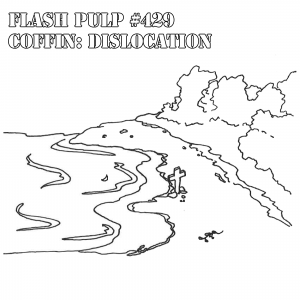 “Indifference? Typical,” said Greta. “I told you this place had warped her. Even in death she does not care about her parents. So ungrateful – so, so: So American.”
“Indifference? Typical,” said Greta. “I told you this place had warped her. Even in death she does not care about her parents. So ungrateful – so, so: So American.”
Mantas only grunted.
Coffin and Bunny stood together as they watched the pair climb the embankment, arm in arm. Within seconds the rented yellow hatchback was back on the highway and out of sight.
There was no wave goodbye, but Bunny consoled herself with the fact that they at least hadn’t spit on her as they departed.
“I missed what you were supposed to tell her – was it anything that would make me feel bad about thinking they’re a couple of puckered-asshole righteousness fondlers?”
“Nah,” answered Coffin. “They said, ‘tell her we can not stand this place. We are still leaving, good luck in the afterlife.”
“They didn’t seem too fuckin’ wadded up about the untimely death, and still missing corpse, of their only offspring? For all they know the bass are slowly shitting out their daughter down there. Why didn’t they at least ask her where her remains were?”
“Some use ritual as a system for dealing with the guilt they ignore. Those folks know they are right and proper, so it’s not their fault they’ve failed to make it in America, or failed to raise their daughter, or failed to change in any way as the world has ground on around them.
“They came to me not to get answers, but to simply put a period on the sentence. They have, to their own minds, done what they can – and now they’ll get on with the next thing.”
As they spoke, the pair climbed the same hill they’d watched the parents scale. Shuffling towards the car they’d rented at the Kulpa’s expense, a sixteen-year-old girl in a Ramones t-shirt and frayed-kneed jeans joined them.
“Exactly,” she said, “and it’s that same unthinking dedication to their ancient ways that would have forced them to drag me back to a place I remember hating as much as I remember it at all – or, if I’d fought hard enough, would have left them in a small town half a world away, complaining endlessly about the daughter they never saw, talked to, or in any way helped support. Still, they’d cry over it, and they wouldn’t even understand why. Just that it’s what is done.
“Better they think I’m dead then a blight upon the family, carousing and living a wild life in America.”
With no more time spent lingering than Matas and Greta had invested, Will, Bunny, and the very alive Melina Kulpas leaned into a quick U-turn, then sped back to the city.
Flash Pulp is presented by http://skinner.fm, and is released under the Creative Commons Attribution-Noncommercial 3.0 Unported License.
Intro and outro work provided by Jay Langejans of The New Fiction Writers podcast.
Freesound.org credits:
Text and audio commentaries can be sent to comments@flashpulp.com – but be aware that it may appear in the FlashCast.
– and thanks to you, for reading. If you enjoyed the story, tell your friends.
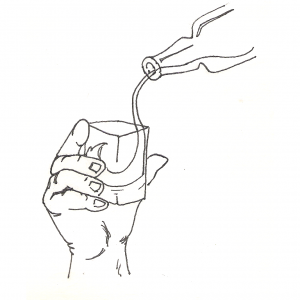 Locating the most notorious drunk in town had only taken three sets of questions, and, as the PI had told Molly when he’d retrieved his bribe from his travel bag, it wasn’t as if the community was about to be overrun with 18-year-old single malt Talisker scotch.
Locating the most notorious drunk in town had only taken three sets of questions, and, as the PI had told Molly when he’d retrieved his bribe from his travel bag, it wasn’t as if the community was about to be overrun with 18-year-old single malt Talisker scotch.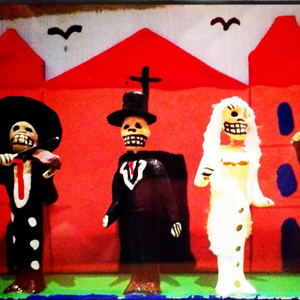 “It didn’t.
“It didn’t.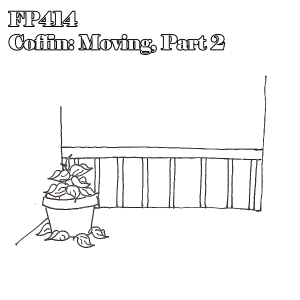 “I’ve been too busy to call around. I’m sorry,” he said. It was a vague sort of statement, and intentionally so.
“I’ve been too busy to call around. I’m sorry,” he said. It was a vague sort of statement, and intentionally so. “Anyhow, my husband, Orlando, he’s not such a fan. He’s not much of a fan of anything these days, really. I keep it way down, and I set a timer so the TV isn’t blathering uselessly into the dark, but Orlando still moved the set over to my side of the bed so I could turn it down a couple more notches.
“Anyhow, my husband, Orlando, he’s not such a fan. He’s not much of a fan of anything these days, really. I keep it way down, and I set a timer so the TV isn’t blathering uselessly into the dark, but Orlando still moved the set over to my side of the bed so I could turn it down a couple more notches.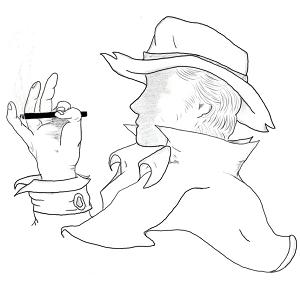 Before long the thin-limbed lass whose wide brown eyes seemed to reflect an unflinching depth beyond a natural understanding was known simply as the Maiden.
Before long the thin-limbed lass whose wide brown eyes seemed to reflect an unflinching depth beyond a natural understanding was known simply as the Maiden.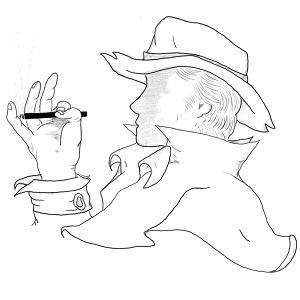 “If you need a place to stay, though,” the muck-handed man with the broad straw hat had said, “I’m sure a few coins could clean mother’s sewing parlour for the evening.”
“If you need a place to stay, though,” the muck-handed man with the broad straw hat had said, “I’m sure a few coins could clean mother’s sewing parlour for the evening.”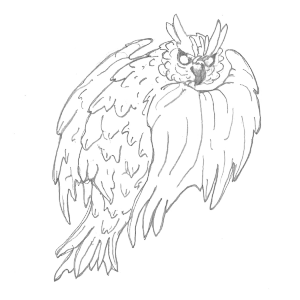 Neither did the nymph’s reaction to his demand to surrender.
Neither did the nymph’s reaction to his demand to surrender.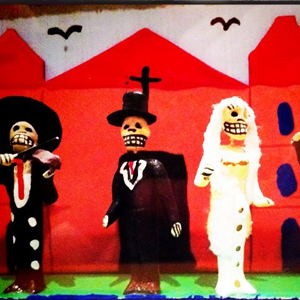 Whatever the case, he first turned to leave, then, at the approach of running boots, began to fade entirely from existence – a maneuver he usually undertook only under the cover of darkness and in the privacy of an unexpectedly invaded bedroom.
Whatever the case, he first turned to leave, then, at the approach of running boots, began to fade entirely from existence – a maneuver he usually undertook only under the cover of darkness and in the privacy of an unexpectedly invaded bedroom.